FFA researcher Dr Wendy-Ann Isaac leads project to preserve and share local seeds, breaking the grip of multinational providers and bolstering food sovereignty
As the rapidly growing world population, climate crisis, and now the war in Ukraine continue to affect the viability and vitality of global food production, the Food and Agriculture Organisation of the United Nations (FAO) has called on countries to bolster their food sovereignty, starting with the preservation of heirloom varieties and protection of local seed systems.
Also called farmers’ varieties, heirloom varieties are crops which have become traditional food staples in countries after being cultivated for decades and their seeds continuously being saved for use in subsequent harvest cycles.
With a handful of multinational agricultural enterprises producing a range of genetically modified (GMO) and hybrid seeds, some of which have established themselves in some countries, there are growing concerns about the food sovereignty of countries like Trinidad and Tobago who are dependent on hybrid seeds for cultivation.
During a 2015 research study on agricultural practices in T&T, Dr Wendy-Ann Isaac surveyed stakeholders in local food production and found that there was a high dependency on imported hybrid seeds.
A senior crop science lecturer at The UWI St Augustine’s Faculty of Food and Agriculture (FFA), Isaac recalled, “The high number of local farmers using imported seeds was very alarming to us, and especially the fact that farmers were seldom saving seeds. What we sought to do was to get a grant to do another study solely concentrated on seeds, especially the production of seeds UW7 sweet corn and ICTA farm corn.”
In 2019, Isaac secured research funding from The UWI TT Research and Development Impact (RDI) Fund and created the Sustainable Seeds of Survival project with the FFA’s support.
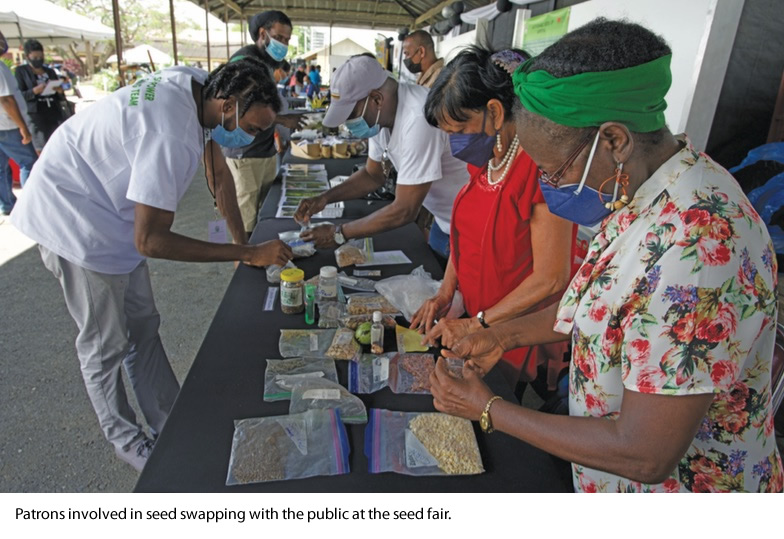
Work on the project started with the refurbishment of a facility at the University Field Station in Valsayn. The facility was previously used as a seed storage and research unit, but was decommissioned due to its state of disrepair and an accident that resulted in the loss of stored seeds. Once up and running, the newly furbished facility was commissioned as the current project’s seed bank.
She said, “There are three different types of seed banks. You have the assitentialist bank, where you bulk up certain seeds and those seeds will be available to farmers; the productivist bank, which involves a lot of research to do breeding works on seeds; and the preservationist bank, where those seeds will be bulked up and kept for use in circumstances like natural disasters.”
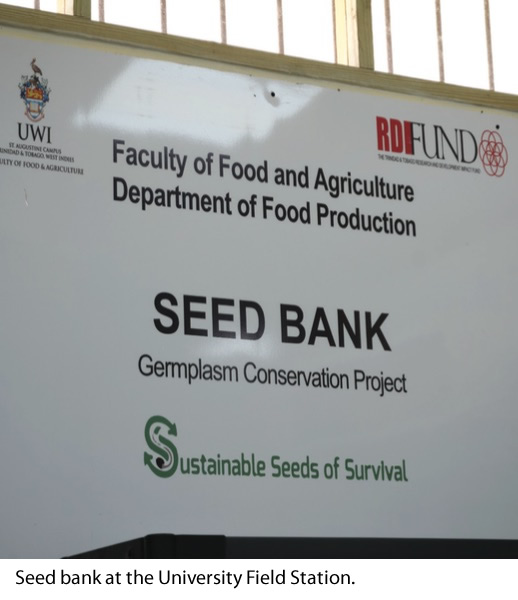
Several species of open-pollinated seeds – including species of corn developed at The UWI, tomatoes, pumpkin, peppers and others – are stored in the bank. Seeds from other local seedbanks in Trinidad are also kept at the UWI seedbank.
Isaac explained the project is supporting the storage and use of open-pollinated seeds given that they are easiest to save from harvests and replant when compared to hybrid seeds.
To expand the project’s educational reach, the FFA held its first annual seed fair themed "Seed of Survival (SOS)" on April 22 to commemorate World Earth Day 2022. In an effort to improve collaboration amongst agricultural stakeholders, the Faculty also launched the TT Seed Savers Network at the event.
The Network is comprised of representatives from the Ministry of Agriculture’s National Seed Bank and Vegetables Unit, AgroPlus 2017 Seed Bank, Kairi Seed Bank, the Biodiversity and Ecosystem Services Network (BES-Net), T&T Field Naturalists’ Club and National Agricultural Marketing Development Company (NAMDEVCO).
From promoting awareness of the importance of seed saving, to collecting, swapping and documenting stories of seed-saving among communities, Isaac is calling on people to join the network which she said will aim to build a culture of sharing open-pollinated seeds and creating a strong genetic resource to ensure future food security and sovereignty.
To fulfill the network’s mandate, educational outreach caravans have already been held at NAMDEVCO Farmers Market in Macoya, Chaguanas and Queen’s Park Savannah.
A seed-saving competition is also being planned among primary schools with 4-H Clubs in the new school term. Participants in the competition will be challenged to start an innovative seed bank or seed library in their own schools and communities.
Describing the network’s efforts, Wuddivira said, “People are being educated and sensitised on the need for seed-saving for a “rainy” day, as well as senitising them on what services we have to train them for seed-saving.”
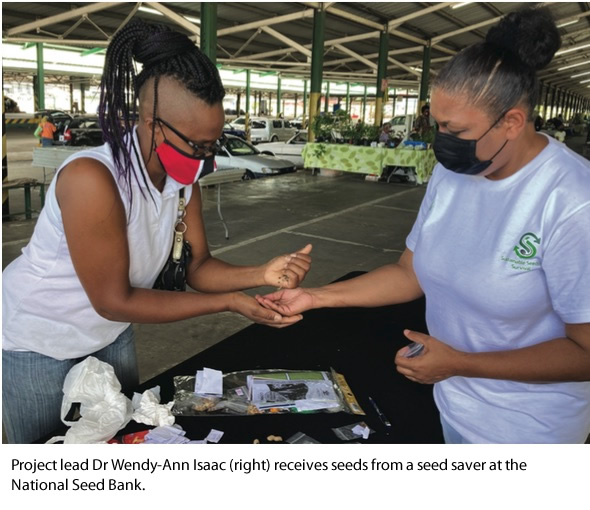
Anyone from farmers to home gardeners can get seed samples from the seed caravan and sign with the bank, but they are required to keep a portion of their harvest to donate seeds to the bank.
Commending the project, FFA Dean Dr Mark Wuddivira said the Faculty continues to strive to be a hub of creative thinkers contributing to the development of innovative solutions to meet the challenges of the day throughout its next 100 years of existence. The Faculty celebrated its 100th anniversary in 2021.
Wuddivira told UWI TODAY, “The availability, accessibility and quality of seeds is a very critical issue, and vitally important to the quantity and quality of food that we produce.
“What we are importing as seeds will be hybrid seeds, but once we plant them – that is it...they are not open-pollinated.
“This means that for the next year or harvest cycle, if you are going to plant again, you’ll have to go back and import more seeds to plant again. You cannot bank any seeds from the ones imported.”
Apart from contributing to the mitigation of current issues like the access to and availability of imported seeds, Wuddivira said the bank ensures local stakeholders have access to seeds of good quality.
He explained, “We at the FFA believe that having greater access to seeds is only part of the solution, as we must also have access to seed varieties that are best suited for our local tropical conditions. We have a specialised seed testing unit where we bring in seeds, we test their viability, and we put them under conditions to see their durability.”
By providing farmers with climate resilient crops, the project also aims to develop their operations to be more climate resilient and environmentally sustainable.
In addition to the seeds provided, once farmers sign up with the TT Seed Saving Network, they will receive training on seed saving, storing and general sustainable cropping systems and practices. Combined, these best management practices are expected to contribute to bolstering a more resilient seed system for Trinidad and Tobago.
In an effort to further improve the project’s sustainability and reduce environmental effects, the project is striving to be zero-waste. The flesh of the fruits and vegetables from which seeds are harvested are used to make a variety of products like chips, powders and flours.
With the production of value-added products from the waste, Wuddivira said a circular economy has been created, which makes the initiative financially sustainable.
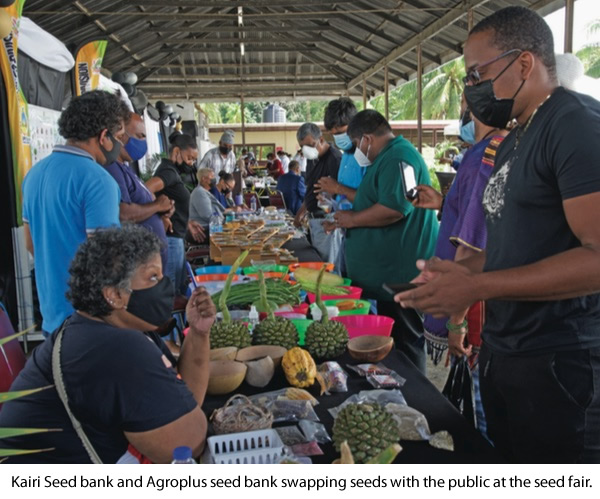
While the network is yet another sign of the project’s continued expansion and progression, Isaac said more funding can tremendously move these and other efforts forward in strengthening a sustainable seed system with collaborating community seedbanks throughout Trinidad and Tobago.
She explained, “We are trying to see if we can attract some more funding for the project because what we want to do is expand the seed bank and make it more resilient. We need more space and we want the bank to be powered by a generator because, in the event of a shortage, we may run the risk of losing seeds. We are looking at the idea of having solar powered generators. So, we are in talks with different funding agencies to see if we can expand the system.”
There are also hopes to get the other UWI campuses involved in the effort to embrace not only the “One UWI” motto, but also help place the university at the forefront of improving regional food security.
Isaac said the COVID-19 pandemic had slowed down these plans, but she has already been in talks with Jamaica’s Rural Agricultural Development Authority and done presentations with the agricultural extension officers in Dominica.
Wuddivira pointed out that 2021 World Food Prize winner Dr Shakuntala Haraksingh Thilsted is one of the FFA’s graduates, and said that the faculty continues to remain committed to ensuring that it creates a space that is sustainable and adaptable to the changing needs of the university and the world.
He added, “While we need to import certain things we cannot produce, a country that relies on (food) importation simply means our survival and the quality of life that we have is dictated by where we are getting our food from. We are looking at sustainability, and we are looking at the quality of the food that we produce, which will affect the quality of what we eat and determine the quality of life.
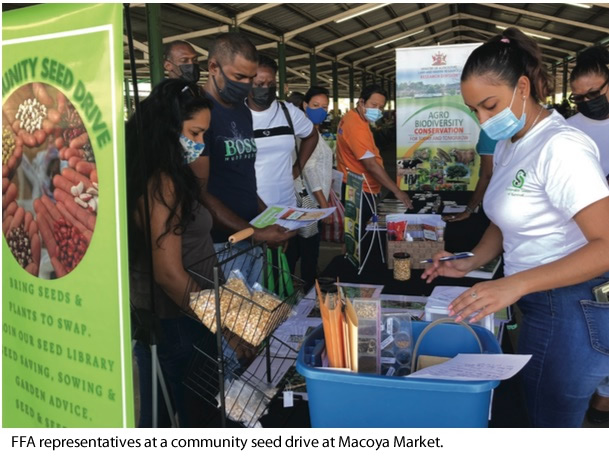
“I think we can look back and see the impact that we have made. But we have not stopped there, as we continue to look at the problems and opportunities.” "We are indeed thankful for the efforts of all our stakeholders, particularly our farmers, namely the AgroPlus Seed bank, NAMDEVCO and even the Ministry of Agriculture in forging a stronger food production system for Trinidad and Tobago.”
People interested in booking a tour of the University Field Station to learn more about this initiative can email Dr Isaac at wendy-ann.isaac@sta.uwi.edu.